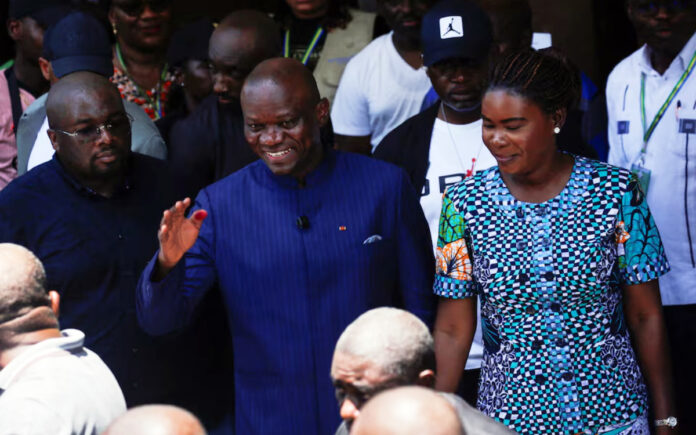Libreville: Brice Oligui Nguema, the transitional leader who seized power in Gabon through a coup in August 2023, has been elected president with a sweeping 90.35% of the vote, according to provisional results released by the interior ministry on Sunday.
The landslide victory formalizes Nguema’s authority nearly 19 months after he ended the Bongo family’s decades-long political dominance in the Central African oil-producing nation, home to about 2.5 million people. The August 2023 coup toppled President Ali Bongo, whose family had ruled Gabon for more than 55 years.
Nguema’s main challenger in the eight-candidate field was Alain Claude Bilie By Nze, who served as prime minister under Bongo at the time of the coup. Nze, 57, garnered just 3.02% of the vote, according to the provisional tally.
Gabon's Interior Minister Herman Immongault said Brice Oligui Nguema, who led a coup in the Central African nation in 2023, won the presidential election with 90.35% of votes cast https://t.co/nieBQj33Jj pic.twitter.com/SAg7FLBevb
— Reuters (@Reuters) April 14, 2025
Sporting a baseball cap emblazoned with his campaign slogan “We Build Together,” Nguema ran on promises to dismantle entrenched corruption and usher in a new political era. He pledged to transform Gabon’s oil-dependent economy by promoting agriculture, tourism, and industrial development in a country where roughly one-third of the population lives in poverty.
Voter turnout reached 70.40%, a notable increase compared to the 56.65% participation rate during the controversial August 2023 election that led to the coup. In that election, Bongo had been declared the winner for what would have been his third term, a result immediately condemned by the opposition as fraudulent. The military intervened shortly after the announcement, seizing power.
Nguema’s election was closely observed by international investors, particularly due to Gabon’s $3 billion in outstanding international bonds. Financial analysts noted the stakes for the country’s economic recovery and political credibility.
Also Read | RSF Takes Control of Zamzam Camp in Darfur, Thousands Displaced
“Prolonged political uncertainty and fears of extended military rule have constrained Gabon’s economic growth, exacerbating the country’s budget deficit and debt levels,” said Mucahid Durmaz, senior Africa analyst at Verisk Maplecroft. “A democratically elected government with a clear mandate will be better positioned to engage with multilateral partners and to pursue fiscal reforms and debt restructuring, which are essential to establishing macroeconomic stability.”
According to the World Bank, Gabon’s economy expanded by 2.9% in 2024, up from 2.4% in 2023, bolstered by infrastructure development and increased production in key sectors such as oil, manganese, and timber.
Also Read | Yemen to Launch 80,000-Troop Push to Retake Hodeidah from Houthis
Nguema will now serve a renewable seven-year term under the new constitution adopted in November 2023. Although he has pledged a definitive break from the Bongo era—characterized by widespread allegations of elite control over the nation’s oil wealth—his own history remains intertwined with the previous regime. He once served as aide-de-camp to Omar Bongo, Ali Bongo’s father, who governed Gabon for more than four decades until his death in 2009.
As Gabon navigates its political transition, the international community will be watching for signs of genuine reform and inclusive governance in a country striving to redefine its future.



